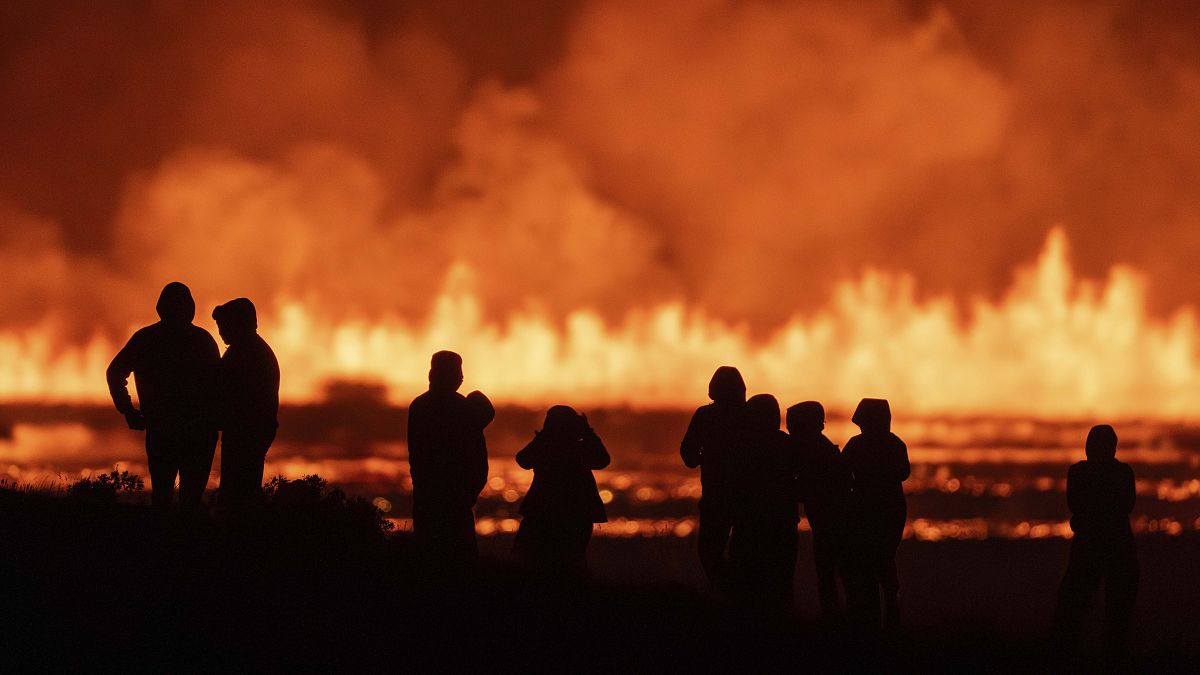Authorities believe the effects of the outbreak will remain localized and roads will be closed, but there is no danger to the population.
A volcano in southwest Iceland erupted for the sixth time since December on Thursday evening, spewing red lava through a new fissure on the Reykjanes peninsula.
The eruption began shortly after 9 p.m. local time (11 p.m. CEST) following a series of strong earthquakes, and within an hour a four-kilometer-wide crack ripped open the Sundhnúkur crater.
The Icelandic authorities say that the effects of the eruption are localized and roads are closed, but there is no danger to the population.
Halldór Björnsson, head of the Norwegian Meteorological Agency’s weather and climate department, told Icelandic news portal Vísir that unlike previous eruptions, the lava flow is not headed toward the town of Grindavik, which was largely evacuated in December when the volcano came to life after 800 years of dormancy.
Magnús Tuma Guðmundsson, a geophysicist who has flown over the eruption centers, told the website: “If it continues like this, Grindavík is not in danger. Of course, we do not know what will happen in the near future, but it is likely that this has reached its peak and then will subside like the other eruptions.”
As news of the eruption spread, hundreds of curious spectators drove to nearby viewing points to observe the stunning natural phenomenon, which has become a major tourist attraction.
“We just thought it was the Northern Lights,” said Mahnoor Ali, who was visiting from Maryland in the U.S. “Honestly, it’s the coolest thing I’ve ever seen in my entire life.”
Friends Ameerul Awalludin from Malaysia and Shohei Miyamito from Japan were with an Icelandic friend when they heard the news and quickly rushed to the vicinity of the eruption.
“We also have something like a volcano,” said Miyamito, “but we cannot see lava like this.”
But for the people who live and work on the Reykjanes peninsula, the regular eruptions and the subsequent evacuation orders will undoubtedly be frustrating.
Repeated volcanic eruptions near Grindavík, a town of 3,800 inhabitants about 50 kilometers southwest of the capital Reykjavik, have damaged infrastructure and property and forced many residents to relocate to ensure their safety.
The few who had returned were forced to leave their homes again on Thursday evening when strong winds blew clouds of toxic gas over the city.
The nearby Blue Lagoon geothermal spa – one of Iceland’s biggest tourist attractions – was also evacuated. Videos appeared on social media showing sirens blaring towards the evening.
Iceland lies above a volcanic hotspot in the North Atlantic and experiences an eruption on average every four to five years. The most devastating recent eruption was the 2010 eruption of the Eyjafjallajökull volcano, which spewed ash clouds into the atmosphere and disrupted transatlantic air travel for months.
This outbreak is not expected to impact air traffic.

